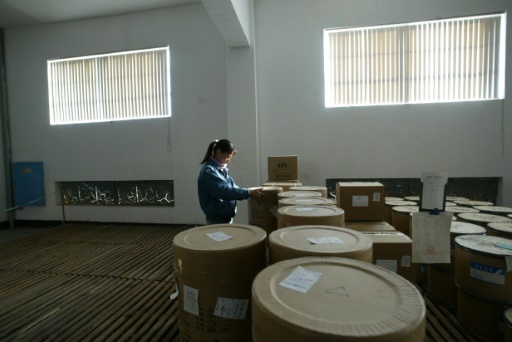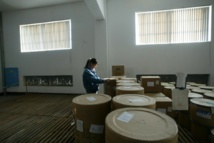On Monday it also earned its Chinese developer, Tu Youyou, a Nobel Medicine Prize.
"It is my dream that Chinese medicine will help us conquer life-threatening diseases worldwide, and that people across the globe will enjoy its benefits for health promotion," Tu wrote in a 2011 commentary in the science journal Nature Medicine.
Her own work was a step in this direction -- Tu's research gave millions access to the anti-malarial action of a herb known by its scientific name Artemisia annua, or commonly as qinghao, wormwood or "sweet Annie".
Artemisinin replaced chloroquine and sulphadoxine-pyrimethamine after the Plasmodium parasite, which causes malaria, developed resistance to both.
Today, it is the main drug in the arsenal against the disease with an estimated 200 million cases and nearly 600,000 deaths per year.
"By the late 1960s, efforts to eradicate malaria had failed and the disease was on the rise," said the Nobel Assembly.
Tu and a team investigated more than 2,000 Chinese herb preparations and at first identified 640 that had possible antimalarial activity -- but with no significant results in experiments with mice except for one: Artemisia annua extract.
But when these promising results could not be replicated, the team were befuddled.
They turned to ancient Chinese literature for help, finding the answer in the writings of alchemist Ge Hong, who died in the year 343.
In "A Handbook of Prescriptions for Emergencies," Ge described Artemisia's properties for reducing the symptoms of malaria and gave this tip: "A handful of qinghao immersed with two litres of water, wring out the juice and drink it all."
Centuries later, his words were a lightbulb moment.
"This sentence gave me the idea that the heating involved in the conventional extraction step we had used might have destroyed the active components," said Tu.
"Extraction at a lower temperature might be necessary to preserve antimalarial activity."
Using a new, lower-temperature method, "we obtained much better activity", she said, showing that the properties of wormwood hailed by previous generations were, indeed, based in science.
- 'A true gift' -
This all happened at the height of the Mao Zedong's chaotic 1966-1976 Cultural Revolution, which saw large numbers of people, including academics, persecuted.
The team had no way to test the product on conventional lab animals, but they were so confident in its safety that they tested it on themselves.
Their courage paved the way to clinical trials in Hainan among patients infected with the parasite.
"Artemisinin... is a true gift from old Chinese medicine," Tu said in the 2011 article.
"But this is not the only instance in which the wisdom of Chinese medicine has borne fruit."
Indeed, we have China to thank for a wide array of treatments that have made their way into mainstream Western medicine -- think acupuncture and massage, or tai chi and qi gong, two body-mind exercises.
- No fairy tale -
In her article, Tu also cited a drug derived from the herb Huperzia serrata undergoing trials in Europe and the United States for treatment of Alzheimer's disease, and another herb, shenlian, which has shown promise in the treatment of atherosclerosis, or hardening of the arteries.
China's history with traditional medicine stretches back thousands of years -- but as with artemisinin, much of it has no orthodox science to back it. Yet.
But it may be exactly this openness to traditional ways that unlocks important future discoveries.
China is well placed to exploit the potential, say some commentators.
Conventional medicine in China today "has an interesting relationship with herbalists and other aspects of traditional Chinese medicine like acupuncture," parasitology expert Colin Sutherland of the London School of Hygiene and Tropical Medicine told AFP.
"They don't see it as a completely fairy tale world," he said.
"So I think they are in a much better position in China to see that there is an herbal medicine that does seem to have some advantages... components they can turn into a pharmaceutical product."
Tu herself underwent two and a half years of training in Chinese medicine for professionals with a background in Western medicine.
--------------------------------------------------------------------------------------------------------
"It is my dream that Chinese medicine will help us conquer life-threatening diseases worldwide, and that people across the globe will enjoy its benefits for health promotion," Tu wrote in a 2011 commentary in the science journal Nature Medicine.
Her own work was a step in this direction -- Tu's research gave millions access to the anti-malarial action of a herb known by its scientific name Artemisia annua, or commonly as qinghao, wormwood or "sweet Annie".
Artemisinin replaced chloroquine and sulphadoxine-pyrimethamine after the Plasmodium parasite, which causes malaria, developed resistance to both.
Today, it is the main drug in the arsenal against the disease with an estimated 200 million cases and nearly 600,000 deaths per year.
"By the late 1960s, efforts to eradicate malaria had failed and the disease was on the rise," said the Nobel Assembly.
Tu and a team investigated more than 2,000 Chinese herb preparations and at first identified 640 that had possible antimalarial activity -- but with no significant results in experiments with mice except for one: Artemisia annua extract.
But when these promising results could not be replicated, the team were befuddled.
They turned to ancient Chinese literature for help, finding the answer in the writings of alchemist Ge Hong, who died in the year 343.
In "A Handbook of Prescriptions for Emergencies," Ge described Artemisia's properties for reducing the symptoms of malaria and gave this tip: "A handful of qinghao immersed with two litres of water, wring out the juice and drink it all."
Centuries later, his words were a lightbulb moment.
"This sentence gave me the idea that the heating involved in the conventional extraction step we had used might have destroyed the active components," said Tu.
"Extraction at a lower temperature might be necessary to preserve antimalarial activity."
Using a new, lower-temperature method, "we obtained much better activity", she said, showing that the properties of wormwood hailed by previous generations were, indeed, based in science.
- 'A true gift' -
This all happened at the height of the Mao Zedong's chaotic 1966-1976 Cultural Revolution, which saw large numbers of people, including academics, persecuted.
The team had no way to test the product on conventional lab animals, but they were so confident in its safety that they tested it on themselves.
Their courage paved the way to clinical trials in Hainan among patients infected with the parasite.
"Artemisinin... is a true gift from old Chinese medicine," Tu said in the 2011 article.
"But this is not the only instance in which the wisdom of Chinese medicine has borne fruit."
Indeed, we have China to thank for a wide array of treatments that have made their way into mainstream Western medicine -- think acupuncture and massage, or tai chi and qi gong, two body-mind exercises.
- No fairy tale -
In her article, Tu also cited a drug derived from the herb Huperzia serrata undergoing trials in Europe and the United States for treatment of Alzheimer's disease, and another herb, shenlian, which has shown promise in the treatment of atherosclerosis, or hardening of the arteries.
China's history with traditional medicine stretches back thousands of years -- but as with artemisinin, much of it has no orthodox science to back it. Yet.
But it may be exactly this openness to traditional ways that unlocks important future discoveries.
China is well placed to exploit the potential, say some commentators.
Conventional medicine in China today "has an interesting relationship with herbalists and other aspects of traditional Chinese medicine like acupuncture," parasitology expert Colin Sutherland of the London School of Hygiene and Tropical Medicine told AFP.
"They don't see it as a completely fairy tale world," he said.
"So I think they are in a much better position in China to see that there is an herbal medicine that does seem to have some advantages... components they can turn into a pharmaceutical product."
Tu herself underwent two and a half years of training in Chinese medicine for professionals with a background in Western medicine.
--------------------------------------------------------------------------------------------------------









 Home
Home Politics
Politics











